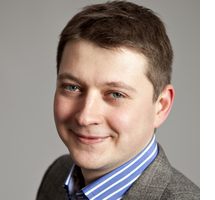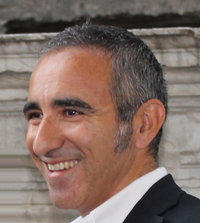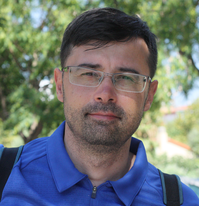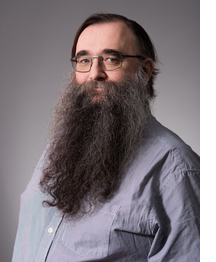
November 6 - 8, 2017/ Munich, Germany
The 9th International Congress
on Ultra Modern Telecommunications and Control Systems





Abstract: The fifth generation (5G) of cellular networks
shall provide connectivity for a wide range of services. Ultra reliable low
latency communication (URLLC) is one of the representative service categories of
high importance for new industrial applications. The 3GPP standardization for
URLLC is now in progress and the current status will be overviewed in the
keynote. The main enablers of low latency and reliability on the physical and
MAC layers, and network slicing on the higher layers will be presented.
 Biography: Dmitry Petrov graduated from
the Physical faculty of M.V. Lomonosov Moscow state university in 2007. He
received his Ph.D. degree (2010) from the same university. In 2009–2011, Dr.
Petrov was an invited expert in several projects, where he developed
mathematical models for telecommunication and financial sectors. Dmitry Petrov
got his second Ph.D. degree (2012) and the title of adjunct professor in
wireless networking technologies (2016) from the University of Jyväskylä,
Finland. In 2011, he joined Magister Solutions Ltd. as a senior researcher. He
contributed to several prize-winning European projects and also worked in
industrial R&D projects. In 2017 he started his work at Nokia. The main
areas of scientific interests for Dr. Petrov are computer simulations of
wireless networks, multi-carrier systems with advanced wave-forms, signal
processing, and innovation in technology. He also continues academic work in
cooperation with several universities. Dr. Petrov is a co-author of more than
30 academic publications in peer-reviewed journals and international
conferences.
Biography: Dmitry Petrov graduated from
the Physical faculty of M.V. Lomonosov Moscow state university in 2007. He
received his Ph.D. degree (2010) from the same university. In 2009–2011, Dr.
Petrov was an invited expert in several projects, where he developed
mathematical models for telecommunication and financial sectors. Dmitry Petrov
got his second Ph.D. degree (2012) and the title of adjunct professor in
wireless networking technologies (2016) from the University of Jyväskylä,
Finland. In 2011, he joined Magister Solutions Ltd. as a senior researcher. He
contributed to several prize-winning European projects and also worked in
industrial R&D projects. In 2017 he started his work at Nokia. The main
areas of scientific interests for Dr. Petrov are computer simulations of
wireless networks, multi-carrier systems with advanced wave-forms, signal
processing, and innovation in technology. He also continues academic work in
cooperation with several universities. Dr. Petrov is a co-author of more than
30 academic publications in peer-reviewed journals and international
conferences.
Abstract: Highly wearable interfaces with haptic feedback is an emerging research trend that will enable novel forms of communication and cooperation between humans and robots. In this keynote, I will introduce design guidelines for wearable interfaces and will review the research in this field. Thanks to wearables the paradigm shift in human-robot cooperation is extraordinary. For example, the robotic sixth finger, a wearable robot designed for reehabilitating the function of the paretic human hand, acts with the paretic limb like the two parts of a gripper working together to stabilize the grasp of objects, like a bottle of water, and let the subject, with upper limb impairments, to use both hands in bimanual tasks. The wearable robotic extra finger works together with a wearable haptic device playing the role of a sensorimotor interface augmenting the level of embodiment of the device. This is an extraordinary case of synergistic use of wearable haptics and wearable robotics to support people with impairments in everyday life. In the plenary I will also present other paradigms of interaction between humans and robots mediated by highly wearable interfaces.
 Biography: Since 2015 Full Professor at
the University os Siena. From 2002 to 2015 Associate Professor of Robotics at
the University of Siena. Since 2009 Scientific Consultant at Istituto Italiano
di Tecnologia, Genova Italy. In 1994, Visiting Scientist at the MIT AI Lab. M.S.
degree in Electronics Engineering and the Ph.D. degree in Robotics and
Automation from the University of Pisa in 1991 and 1995, respectively.
Biography: Since 2015 Full Professor at
the University os Siena. From 2002 to 2015 Associate Professor of Robotics at
the University of Siena. Since 2009 Scientific Consultant at Istituto Italiano
di Tecnologia, Genova Italy. In 1994, Visiting Scientist at the MIT AI Lab. M.S.
degree in Electronics Engineering and the Ph.D. degree in Robotics and
Automation from the University of Pisa in 1991 and 1995, respectively.
Abstract: Most of modern telecom applications and video streaming services are developed in customer-centric style. This style requires knowledge about user experience to improve a service performance. Main topic of this keynote is quality of experience (QoE) paradigm commonly used for assessment of user satisfaction and for prediction of customer’s emotional feedback in different states of considered services. Keynote includes a brief history, a description of main approaches for numerical criteria developing and possible ways of services improvement using QoE prediction.
Standardization of QoE started in the middle of 1990s. ITU-T initiated p.900 series for subjective assessment of audiovisual quality in multimedia services. Most common numerical criteria are mean opinion score (MOS) and its modifications. MOS prediction is usually based on machine learning methods. Most common class of methods is supervised learning. However, methods from this class meet an issue requiring a large set of data that describes user feedback about his/her satisfaction for each service feature. Such data can be obtained using crowdsourcing or laboratory measurement but they require a lot of participants and careful results processing. A final part of keynote is dedicated to video streaming performance improvement using QoE prediction.
 Biography: Marat Gilmutdinov graduated
from Saint Petersburg State University of Aerospace Instrumentation (SUAI) in
1998. He received his PhD degree in Computer science in 2002. He was an
assistant professor and then an associate professor at Infocommunication systems
department of SUAI teaching disciplines related to digital signal processing and
information theory. Marat was also a Head of multimedia signal processing (MSP)
laboratory in SUAI from 2009 to 2016 supervising joint R&D projects with
Intel Labs, EMC, LG Display and other industrial companies. He is a co-author of
10+ international patents related to visual signal processing, interpolation and
compression methods. His main research interests are motion estimation
algorithms, visual objects recognition, image and video compression and
transmission methods. Marat joined Huawei as a Principal engineer in 2017. His
current scope of responsibilities is a development of algorithms for AI-based
applications, e.g. chatbots and question-and-answering systems.
Biography: Marat Gilmutdinov graduated
from Saint Petersburg State University of Aerospace Instrumentation (SUAI) in
1998. He received his PhD degree in Computer science in 2002. He was an
assistant professor and then an associate professor at Infocommunication systems
department of SUAI teaching disciplines related to digital signal processing and
information theory. Marat was also a Head of multimedia signal processing (MSP)
laboratory in SUAI from 2009 to 2016 supervising joint R&D projects with
Intel Labs, EMC, LG Display and other industrial companies. He is a co-author of
10+ international patents related to visual signal processing, interpolation and
compression methods. His main research interests are motion estimation
algorithms, visual objects recognition, image and video compression and
transmission methods. Marat joined Huawei as a Principal engineer in 2017. His
current scope of responsibilities is a development of algorithms for AI-based
applications, e.g. chatbots and question-and-answering systems.
Abstract: Public use of interconnected computers has introduced problems in protecting these networks. Descriptions of the protocols which enable this communication are publicly accessible, and anyone may implement these protocols in networked devices, limited only by their understanding and capacity. Uncertainties and/or flaws in implementation standards have created opportunities for those with malicious intentions to inject malware, open encrypted communication, destroy or flood communication channels, and access to protected content without authorization. Even flawless implementations can still be abused to steal intellectual property or personal data.
Basic Intrusion Detection/Protection systems allow limited traffic monitoring and some attack detection through simple rulesets. However, GREYCORTEX MENDEL is an advanced tool for monitoring and evaluating anomalies in the communications of an entire network. By using Artificial Intelligence and assisted machine learning, MENDEL is able to identify anomalous communication between devices and detects new and unknown attacks which are invisible to simple rulesets or IDS/IPS tools. Furthermore, MENDEL identifies behavioral anomalies in devices and users within a network. Finally, unlike tools based on the Netflow protocol, MENDEL measures detailed communication flow parameters, making identification of weak security or low user experience sources in e-shops or content provisioning systems possible.
 Biography: Vladimír Sedláček is
CTO of GREYCORTEX. He is an experienced developer, analyst, and administrator.
He has developed countless web platforms and infrastructure implementations,
serving tens of millions of clients. He has a passion for computer and network
security and has completed many courses on security management, hacking, and has
passed Certified Ethical Hacker and Certified Livewire Investigator exams. He
operates a small ISP.
Biography: Vladimír Sedláček is
CTO of GREYCORTEX. He is an experienced developer, analyst, and administrator.
He has developed countless web platforms and infrastructure implementations,
serving tens of millions of clients. He has a passion for computer and network
security and has completed many courses on security management, hacking, and has
passed Certified Ethical Hacker and Certified Livewire Investigator exams. He
operates a small ISP.
January 17, 2018: We are happy to let you know that the accepted ICUMT 2017 papers are now available in the IEEE Xplore.
December 22, 2017: We are happy to let you know that IEEE has accepted the ICUMT 2017 proceedings for publication in IEEE Xplore. The papers should be available online in few weeks.
November 16, 2017: The ICUMT 2017 photos are now available at the Official Facebook page.
November 15, 2017: We thank to all ICUMT 2017 participants, chairs, reviewers and guests you for your help, cooperation in the review process and participation in the congress and so helping us to make this event successful.
October 30, 2017: The ICUMT 2017 program has been finalized. The current version is available on this link.
October 23, 2017: The ICUMT 2017 program is available on this link.
September 21, 2017: Due to numerous requests, deadline for Final Paper Submission has been extended until September 25, 2017.
September 20, 2017: The ICUMT 2017 offers also practical tutorials. The first confirmed tutorial is RECENT ENERGY EFFICIENT PROTOCOLS FOR WIRELESS SENSOR NETWORKS given by Dr. Korhan Cengiz.
September 20, 2017: The instructions how to prepare and submit the final manuscript are available in the Author's Area.
September 12, 2017: The ICUMT 2017 registration has been opened. Please use this link to register your paper and proceed with the payment.
September 12, 2017: The review process of the ICUMT 2017 papers (main tracks) is successfully finished. The notifications of paper acceptance/rejection have been sent to authors via email.
September 4, 2017: There will be a slight delay in announcing the final results caused by reviewing high number of submissions in limited time. We are thankful for your patience.
July 17, 2017: Due to numerous requests, deadline for Regular Paper Submission has been extended until July 24, 2017 (FINAL DEADLINE).
June 29, 2017: The deadline for Regular Paper Submission has been extended until July 17.
June 28, 2017: The list of confirmed workshops collocated with the ICUMT 2017 already includes FOAN 2017 and RABAN 2017 workshops. For more details, check this link.
June 27, 2017: The ICUMT 2017 is registered under the IEEE Conference Record #42318.
May 12, 2017: The technical co-sponsorship by IEEE Region 8 and IEEE Germany Section has been fully approved.
April 28, 2017: ICUMT 2017 websites launched!":http://www.icumt.info/2017/
April 13, 2017: ICUMT 2017 will be hosted this time in Munich, Germany on 6–8 November
Deadline for Workshop Proposal: May 26, 2017 Deadline for Regular Paper Submission (HARD): July 24, 2017 Notification of Paper Acceptance: September 11, 2017 Final Paper Submission: September 25, 2017 Authors' Early Registration and Payment: September 29, 2017 Authors' Late Registration and Payment: October 13, 2017